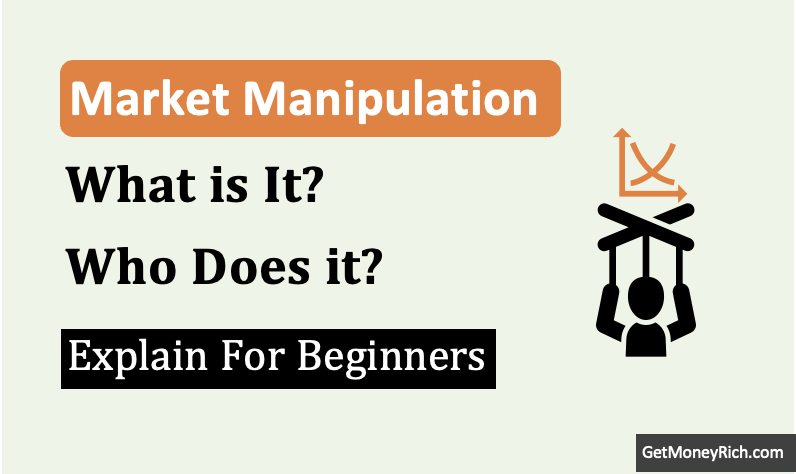Evr felt like a stock price was acting a little…offfLike it was Climbing Way Too Fast or Plummeting for Seemingly No Reason? That count bee Market Manipulation at PlayBasically, Market Manipulation is when someone intently tries to Mess with the natural forces of supply and demand in the marketThey’re trying to artificially inflate or deflate a stock’s price. This way, they are creating a false impression of its true value.
To. Undrstand it, think of this analogy. You’re trying to buy a used car. But Intead of Honest Reviews and Reliable Info, Someone’s feeding you a bunch of lies to make you think it’s a dream car when it’s actually a lemon. Market manipulation does the same thing to stock pristers,
Why is this a problem? Well, Manipulated Prisis Lead to Bad Investments Decisions. You might buy a stock that’s artificially inflated and then watch it crash, leave you with a loss.
It distrusts the market and makes it harder to make smart, informed choices. And unfortunately, it’s usually the Institutional Players who Profit whose Investors Like Us Get Burned,
According to a study by the Financial Industry Regulatory Authority (Finra), Manipulated Stocks underperform the market by an average of 30% in the manipulation the manipulation. So, yeah, it’s a big deal.
Who are the usual suspects?
So, who’s Pulling these strings? It’s usually not your everyday investor. We’re Talking about:
- Institutional Investors (Hedge Funds, Investment Banks): These guys have serial money and resources, Making them Powerful Enough to Influence Market Sentiment.
- High-Frequency traders (hfts) & algorithmic trading firms: These companies use super-fast computers and complex algorithms to Trade stocks, sometimes using tactics that can be considered manipulative.
- Company Insiders & Promoters: People with access to non-Public information about a company can use that to their advantage.
- Social media influencers: Nowadays even a tweet from a popular influencer can affect a stock price.
Why do they do it? The main reason is ProfitThey want to buy low and sell high (or short high and buy low) And market manipulation helps them to do that more easy.
What is Short Selling? Imagine betting a friend their new bike will be Wort less year. “Shorting” is similar, you borrow a stock, sell it at today’s high price, hoping its value drops. If it does, you buy it back cheaper, return it, and pocket the different. Manipulators Might Spread Rumors to Force the Price Down, Letting them buy back low after they initially Shorted High,
Some may do it to create liquidity (Making a stock look more attractive by boosting trading volume) or to influence how people feel about a stock (Sentment).
The Dirty Tricks: Common Market Manipulation Tactics
Let’s get down to the nitty-gritti and look at some of the most common market manipulation tactics. We’ll use real-life (or super realistic) examples to help you wrap your head Around them.
a) pump and dump
This is a classic scam. Picture this, some online “guru” starts hyping up a tiny, unknown stock (often a penny stock) to their followers, class it’s the next big thing. People get Caught up in the Hype (FOMO) and Start Buying, Driving The Price Up. The “Guru,” who bough the stock way before anyone else, then sells their shares at the peak, making a huge duty. The price crashes, and everyone else is left holding the bag.
Example, Remember the Meme Stock Craze? While not all meme stocks were pump -and-dumps, some definitely had elements of it. Social Media Hype Fuled Rapid Price Increases, And Some Individuals Profited Handsomely While Many Later Lost Money when the Hype Died Down.
b) Short and distort
The opposite of “pump and dump.”
Here, The Manipulator Spreads False or Misleading Negative Information About A Company to Drive its stock price down. They short the stock (Betting that it will go down) and then profit as the price falls.
Example, Imagine a heedge fund releasing a report with exaggerated or False Claims about a company’s financial Troubles, Causing Investors to Panic and Sell his shares.
c) Spoofing and layering
This is a bit more technical, but it’s important to know.
Spoofing involves Placing Large Orders to Buy or Sell a StockIt is done to create the illusion of demand or supply. But the orders are canceled before They can be executed. This tricks other traders into thinking the price is going to move in a certain direction, and they react accordingly.
Layering is a more complex version of spoofing, using multiple orders at different price levels.
Example, Imagine a trader placing a huge order to Buy A stock, making it look like there’s strong demand. Other traders see this and start buying too, pushing the price up. The original trader then cancer their order and sells their shares at the higher price.
d) wash trading
This is creating fake trading volume by buying and selling the same security multiple times between accounts that you control. This makes the stock look more active and attractive to other investors.
Example, Some Cryptocurrency Exchanges have been accused of wash trading to inflate their trading volumes and attract more users.
e) Insider Trading
This is probally the most well-known type of market manipulation.
It involves using non-Public information to trade stocks for personal gain. Think of a company executive knowledge about an upcoming merger that will send the stock price Soaring. If they buy the stock before the news is announced, that’s insider trading.
Example, The Raj Rajaratnam Case is a Famous Example of Insider Trading The Galleon Group, A Hedge Fund. Rajaratnam didn’t just stumble upon the information. He Cultivated a Network of Insides who Leaked Confidential Details About Companies like Goldman Sachs and Intel, which would have been given to Unethical Gains.
f) bear raids
A coordinated effort by short sellers to aggressively drive down a stock’s price.
This involves a mix of Media Manipulation (Spreading Rumors), Taking Large Short Positions, and Creating Panic Among Investors.
Example, Hedge Funds Might Target a Company they believe is overvaluated and spread negative news about it, lead to a rapid decline in its stock price.
So, how to do this screenw over retail investors?
Market manipulation is a nightmare for retail investors believe:
- Misleading Pries: It creates a False Sense of a stock’s true value, leading to bad investment decisions.
- Increased Volativity: Manipulation can cause wild price swings, leading to panic buying or selling.
- Wrong Timing: Retail investors of the market at the Wrong Time, Buying High during a “Pump” or Selling Low during a “Distort,” Resulting in Losses.
- Narrative manipulation: Investors Believe Fake News Spread by Manipulators.
Basically, you’re playing a rigged game where the odds are stacked against you.
How regulators try to stop the bad guys
Regulatory bodies like the sec (Securities and Exchange Commission) in the us are tasked with preventing market manipulation. They have laws against insider trading, spoofing, and pump-dump schemes. They also monitor trading activity and Investigate Suspicious Behavior.
But let’s be real – Enforcement is tough. The sec is locked in a constant technological arms race with manipulators. Plus, proving “Intent” is a huge hurdle. Did someone Intend To manipulate the market, or we they just making a bad investment decision? This is not easy to establish. Also, they have jurisdictional issues. Market manipulation is not easy to regulate as manipulators adopt new tactics.
How to Protect yourself?
You might be thinking, “great, so the market is rigged. What’s the point? ” Don’t Lose Hope.
There are things you can do to protect yourself:
- Recognize the red flags: Be Wary of Stocks with Unusual Volume Spikes, Aggressive Promotions, or News that seems too good to be true.
- Avoid illiquid stocks: Stocks with low Trading Volume Are Easier to Manipulate. Stick to more liquid stocks.
- Fact-check everything: Don’t believe everything you read online. Verify News sources before reacting.
- Long-term investment: Focus on long-term investment rather than reacting to short-term noise. It’s harder to be manipulated if you do’T day-trade.
- Fundamental analysis: Learn how to analyze a company’s financials to determine its true value, raather than related on Hype.
- Be skeptical of hype: If Everyone’s Talking About a Stock, that should be a warning sign.
- Diversify your portfolio: Don’t put all your eggs in one basket.
- Join Investor Advocacy Groups: Support and Participate in Organizations that Fight for Retail Investor Rights.
- Stay updated on regulatory changes: Keep an eye on what the sec or other regulators are ding. New Rules Can Impact How the Game is Played.
Can Market Manipulation Be Stopped?
The harsh truth, probally not complete.
As long as there’s money to be made, there will be people trying to game the system. But that doesn’t meaning you’re helpless. Byeing informed, skeptical, and focusing on Solid Investment Strategies, You Can Significantly Reduce Your Risk of Being a Victim of Market Manipulation.
Don’t Chase the Next Get-Rich -Quick Scheme.
Focus on building a diversified portfolio based on sound Financial Principles. It might not be as exciting as riding a meme stock to the moon, but it’s a lot less likely to end in a crash.
The ethics of the game
Let’s be Real – Sometimes, It Feels Like the Whole Financial World is a Bit… Ethically Gray. So, Should Big Institutional Investors Care If Their Tactics Might Hurt Small Investors?
I think they should. While they’re legally allowed to do a lot of things, it doesn Bollywood mean it’s RightThey have a ton of power, and with that comes responsibility. I mean, the market should be fair for everything, not just that with the biggest wallets.
The Financial Media also has a big role to play here. They need to be careful about the stories they promote and make sure they’re not just just amplifying Hype or Spreading Misinformation. If a news source says a particular stock is great – Ask yourself what vesteged interest they have
Ultimately, it’s all about being aware and making informed decisions. The more we talk about these issues, the more we can hold everyone accountable.
Have a happy investment.
(Tagstotranslate) pump and dump schemes (T) Retail Investor Protection (T) Stock Market Scams

